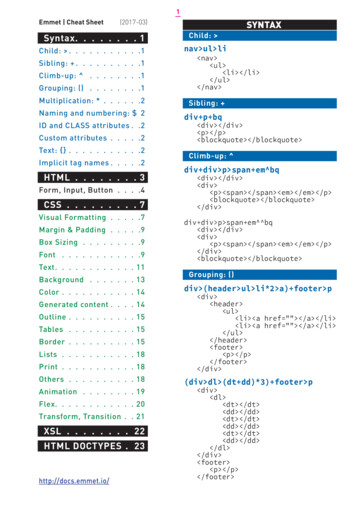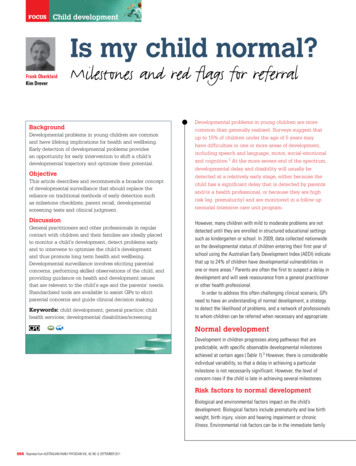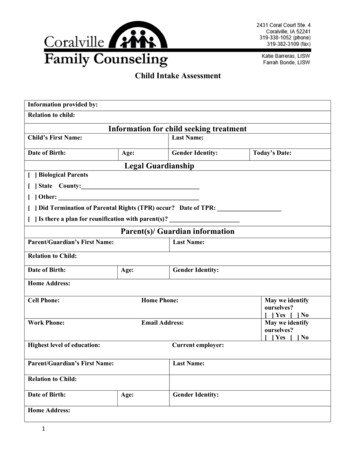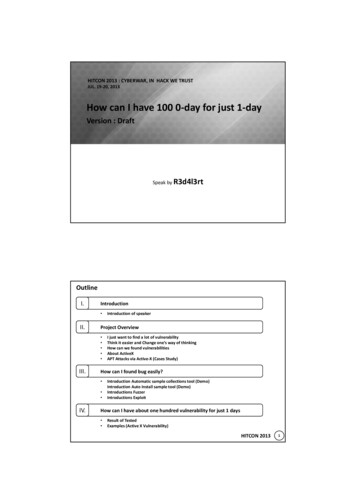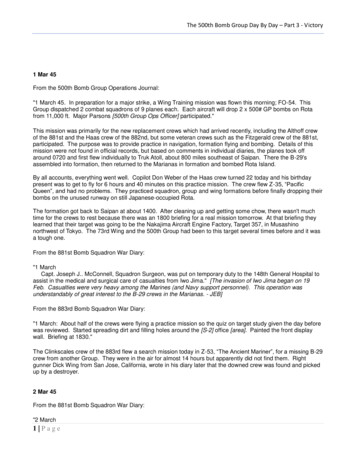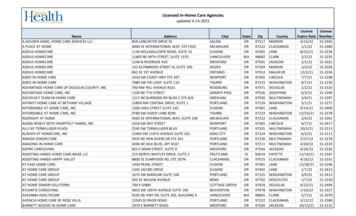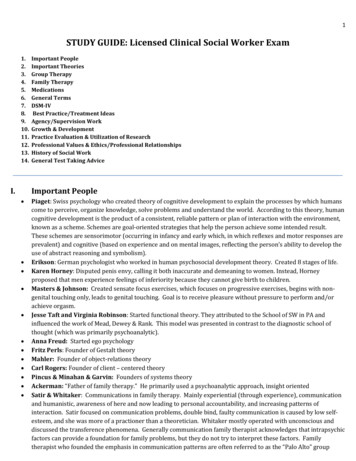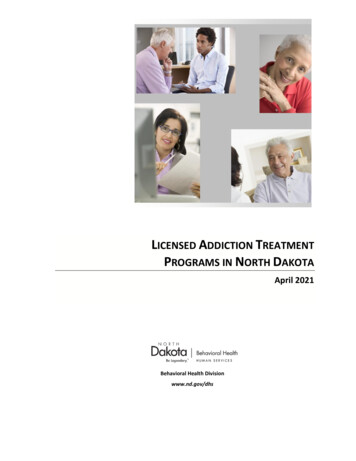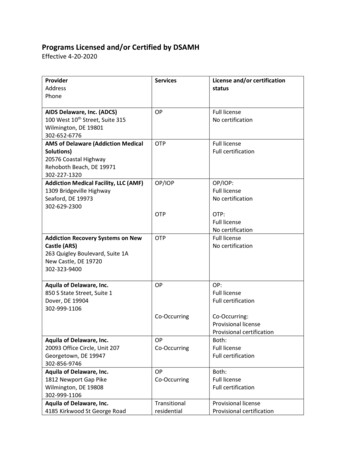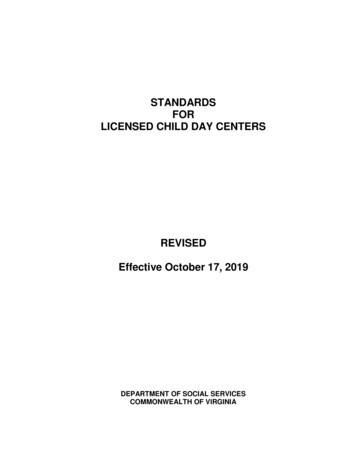
Transcription
STANDARDSFORLICENSED CHILD DAY CENTERSREVISEDEffective October 17, 2019DEPARTMENT OF SOCIAL SERVICESCOMMONWEALTH OF VIRGINIA
STANDARDSFORLICENSED CHILD DAY CENTERSAdopted By The Child Day-Care CouncilJuly 8, 1993Effective: November 1, 1993Amended By The Child Day-Care CouncilJune 8, 1995Effective: March 1, 1996Amended By The Child Day-Care CouncilMay 15, 1998Effective: September 1, 1998Amended By The Child Day-Care CouncilJanuary 24, 2005Effective: June 1, 2005Amended By The Child Day-Care CouncilMay 10, 2007Effective: July 11, 2007Amended By The Child Day-Care CouncilNovember 8, 2007Effective: March 6, 2008Amended By The Child Day-Care CouncilNovember 10, 2011Effective: January 5, 2012Amended By The State Board of Social ServicesAugust 16, 2012Effective: November 1, 2012Amended By The State Board of Social ServicesAugust 17, 2016Effective: October 19, 2016Amended By The State Board of Social ServicesAugust 21, 2019Effective: October 17, 2019VIRGINIA DEPARTMENT OF SOCIAL SERVICESDIVISION OF LICENSING801 E. MAIN STREETRICHMOND, VIRGINIA 23219-1849
PREAMBLEThe State Board of Social Service has authority for the following set of standards forcenters serving children under the age of 13 who are separated from their parents orguardians during a part of the day. The purposes of the standards are (i) to ensurethat the activities, services, and facilities of child day centers are conducive to thewell-being and development of children and (ii) to reduce health and safety risks inthe caregiving environment.The Virginia Department of Social Services licenses child day centers and enforcesthe standards through announced and unannounced visits. Every effort is made toprotect the rights of children in care and licensees by enforcing the standards usingdiscretion and judgment. When appropriate, technical experts may be consulted toassure accurate compliance determination with the standards. Child day centeroperators regulated by these standards may request an exception (allowablevariance) for any standard that creates a special hardship unless the standard isrequired by law or another agency’s regulation. Licensees are encouraged todiscuss any concerns about licensing procedures, interpretation and application ofstandards, or the actions of licensing personnel with the licensing inspector and, ifnecessary, supervisory personnel at the field or home office level.The regulation entitled General Procedures and Information for Licensure containsprocedures for licensure, allowable variances, problem solving conferences,complaint investigations and sanctions. Please refer to that document for detailedinformation on these topics.
TABLE OF CONTENTSPage 1 of 4PART IPageINTRODUCTION . 122VAC40-185-10Definitions . 122VAC40-185-20Legal base .622VAC40-185-30Purpose and applicability. 6PART IIADMINISTRATION .722VAC40-185-40Operational responsibilities . 722VAC40-185-50General recordkeeping; reports .822VAC40-185-60Children’s records .922VAC40-185-70Staff records . 1022VAC40-185-80Attendance records; reports . 1122VAC40-185-90Parental agreements .1122VAC40-185-100Enrollment procedures of therapeutic child day programsand special needs child day programs .1222VAC40-185-110Individual assessment for therapeutic child day programs .1222VAC40-185-120Individual service, education or treatment plan fortherapeutic child day programs . 1222VAC40-185-130Immunizations for children .1322VAC40-185-140Physical examinations for children .1322VAC40-185-150Form and content of immunizations and physicalexamination reports for children .1522VAC40-185-160Tuberculosis screening for staff and independentcontractors.1522VAC40-185-170PART IIIPhysical and mental health of staff and volunteers . 16STAFF QUALIFICATIONS AND TRAINING . 1722VAC40-185-180General qualifications .1722VAC40-185-190Program director qualifications.1722VAC40-185-200Program directors and back-up for program directors .2022VAC40-185-210Program leader qualifications .2022VAC40-185-220Aides. 2222VAC40-185-230Independent contractors; volunteers .22
TABLE OF CONTENTSPage 2 of 422VAC40-185-240PART IVPageStaff training and development . 22PHYSICAL PLANT . 2722VAC40-185-250Approval from other agencies; requirements prior to initiallicensure . 2722VAC40-185-260Approval from other agencies; requirements subsequent toinitial licensure . 2822VAC40-185-270Building maintenance. 2922VAC40-185-280Hazardous substances and other harmful agents . 2922VAC40-185-290General physical plant requirements for centers servingchildren of preschool age or younger . 3122VAC40-185-300General physical plant requirements for centers servingschool age children . 3122VAC40-185-310Areas . 3122VAC40-185-320Restroom areas and furnishings . 3222VAC40-185-330Play areas. 34PART VSTAFFING AND SUPERVISION . 3522VAC40-185-340Supervision of children . 3522VAC40-185-350Staff-to-children ratio requirements . 36PART VIPROGRAMS . 4022VAC40-185-360Daily activities . 4022VAC40-185-370Daily activities for infants . 4022VAC40-185-380Daily activities for toddlers and preschoolers. 4222VAC40-185-390Daily activities for school age children . 4322VAC40-185-400Behavioral guidance . 4322VAC40-185-410Forbidden actions . 4422VAC40-185-420Parental involvement . 4422VAC40-185-430Equipment and materials. 4722VAC40-185-440Cribs, cots, rest mats, and beds . 49
TABLE OF CONTENTSPage 3 of 4Page22VAC40-185-450Linens .5022VAC40-185-460Swimming and wading activities; staff and supervision .5122VAC40-185-470Pools and equipment. 5122VAC40-185-480Swimming and wading; general .52PART VIISPECIAL CARE PROVISIONS AND EMERGENCIES . 5322VAC40-185-490Preventing the spread of disease .5322VAC40-185-500Hand washing and toileting procedures .5322VAC40-185-510Medication . 5522VAC40-185-520Over-the-counter skin products .5722VAC40-185-530First aid training, cardiopulmonary resuscitation (CPR) andrescue breathing. 5922VAC40-185-540First aid and emergency supplies .5922VAC40-185-550Procedures for emergencies .61PART VIIISPECIAL SERVICES .6422VAC40-185-560Nutrition and food services.6422VAC40-185-570Special feeding needs.6622VAC40-185-580Transportation and field trips .6722VAC40-185-590Transportation for nonambulatory children . 6922VAC40-185-600Animals and pets .6922VAC40-185-610Evening and overnight care . 70
TABLE OF CONTENTSPage 4 of 4ATTACHMENTSATTACHMENT ISchool Entrance Health FormATTACHMENT IIAsbestos Inspections in Child Day Centers(§ 63.1-198.01 of the Code of Virginia)ATTACHMENT IIIAsbestos InformationATTACHMENT IV Child Care Food Program Meal PatternsATTACHMENT VChild Restraint Devices and Safety Belts for TransportingChildren (§§ 46.2-1095 -46.2-1100 of the Code of Virginia)ATTACHMENT VI Department of Environmental Quality: Air quality Control ColorChart via http://www.deq.state.va.usATTACHMENT VII National Program for Playground Safety’s Selecting PlaygroundSurface Materials guideline handbook
STATE BOARD OF SOCIAL SERVICESSTANDARDS FOR LICENSEDCHILD DAY CENTERS22VAC40-185Page 1 of 7110/19CHAPTER 185STANDARDS FOR LICENSED CHILD DAY CENTERSPART I.INTRODUCTION22VAC40-185-10. Definitions.The following words and terms when used in this chapter shall have the followingmeanings unless the context clearly indicates otherwise:"Adult" means any individual 18 years of age or older."Age and stage appropriate" means the curriculum, environment, equipment, and adultchild interactions are suitable for the ages of the children within a group and theindividual needs of any child."Age groups":1. "Infant" means children from birth to 16 months.2. "Toddler" means children from 16 months up to two years.3. "Preschool" means children from two years up to the age of eligibility to attendpublic school, five years by September 30.4. "School age" means children eligible to attend public school, age five or older bySeptember 30 of that same year. Four-year old or five-year-old children includedin a group of school age children may be considered school age during thesummer months if the children will be entering kindergarten that year."Attendance" means the actual presence of an enrolled child."Balanced mixed-age grouping" means a program using a curriculum designed to meetthe needs and interests of children in the group and is planned for children who enterthe program at three through five years of age. The enrollment in the balance mixedage grouping comprises a relatively even allocation of children in each of threeage(three to six years) and is designed for children and staff to remain together withturnover planned only for the replacement of exiting students with children of ages thatmaintain the class balance."Body fluids" means urine, feces, saliva, blood, nasal discharge, eye discharge, andinjury or tissue discharge.
STATE BOARD OF SOCIAL SERVICESSTANDARDS FOR LICENSEDCHILD DAY CENTERS22VAC40-185Page 2 of 7110/19"Camp" means a child day camp that is a child day center for school age children thatoperates during the summer vacation months only. Four-year-old children who will befive by September 30 of the same year may be included in a camp for school agechildren."Center" means a child day center."Child" means any individual under 18 years of age."Child day center" means a child day program offered to (i) two or more childrenyounger than 13 years of age in a facility that is not the residence of the provider or ofany of the children in care or (ii) 13 or more children at any location."Child day program" means a regularly operating service arrangement for childrenwhere, during the absence of a parent or guardian, a person or organization has agreedto assume responsibility for the supervision, protection, and well-being of a child youngerthan 13 years of age for less than a 24-hour period.Note: This does not include programs such as drop-in playgrounds or clubs forchildren when there is no service arrangement with the child's parent."Children with special needs" means children with developmental disabilities, mentalretardation, emotional disturbance, sensory or motor impairment, or significant chronicillness who require special health surveillance or specialized programs, interventions,technologies, or facilities."Cleaned" means treated in such a way to reduce the amount of filth through the use ofwater with soap or detergent or the use of an abrasive cleaner on inanimate surfaces."Commissioner" means the Commissioner of the Virginia Department of SocialServices."Communicable disease" means a disease caused by a microorganism (bacterium,virus, fungus, or parasite) that can be transmitted from person to person via an infectedbody fluid or respiratory spray, with or without an intermediary agent (such as a louse,mosquito) or environmental object (such as a table surface). Some communicablediseases are reportable to the local health authority."Department" means the Virginia Department of Social Services."Department's representative" means an employee or designee of the VirginiaDepartment of Social Services, acting as the authorized agent of thecommissioner."Evening care" means care provided after 7 p.m. but not through the night.
STATE BOARD OF SOCIAL SERVICESSTANDARDS FOR LICENSEDCHILD DAY CENTERS22VAC40-185Page 3 of 7110/19"Good character and reputation" means knowledgeable and objective people agree thatthe individual (i) maintains business, professional, family, and community relationshipswhich are characterized by honesty, fairness, and truthfulness and (ii) demonstrates aconcern for the well-being of others to the extent that the individual is consideredsuitable to be entrusted with the care, guidance, and protection of children. Relatives byblood or marriage and people who are not knowledgeable of the individual, such asrecent acquaintances, shall not be considered objective references."Group of children" means the children assigned to a staff member or team of staffmember."High school program completion or the equivalent" means an individual has earned ahigh school diploma or General Education Development (G.E.D.) certificate, or hascompleted a program of home instruction equivalent to high school completion."Independent contractor" means an entity that enters into an agreement to providespecialized services or staff for a specified period of time."Individual service, education or treatment plan" means a plan identifying the child'sstrengths, needs, general functioning and plan for providing services to the child. Theservice plan includes specific goals and objectives for services, accommodations andintervention strategies. The service, education or treatment plan clearly showsdocumentation and reassessment or evaluation strategies."Intervention strategies" means a plan for staff action that outlines methods, techniques,cues, programs, or tasks that enable the child to successfully complete a specific goal."Licensee" means any individual, partnership, association, public agency, or corporationto whom the license is issued."Minor injury" means a wound or other specific damage to the body such as, but notlimited to, abrasions, splinters, bites that do not break the skin, and bruises."Overnight care" means care provided after 7 p.m. and through the night."Parent" means the biological or adoptive parent or legal guardian of a child enrolled inor in the process of being admitted to a center."Physician" means an individual licensed to practice medicine in any of the 50 states orthe District of Columbia."Physician's designee" means a physician, licensed nurse practitioner, licensedphysician assistant, licensed nurse (R.N. or L.P.N.), or health assistant acting under thesupervision of a physician."Primitive camp" means a camp where places of abode, water supply system, orpermanent toilet and cooking facilities are not usually provided.
STATE BOARD OF SOCIAL SERVICESSTANDARDS FOR LICENSEDCHILD DAY CENTERS22VAC40-185Page 4 of 7110/19"Programmatic experience" means time spent working directly with children in a groupthat is located away from the child's home. Work time shall be computed on the basis offull-time work experience during the period prescribed or equivalent work time over alonger period. Experience settings may include a child day program, family day home,child day center, boys and girls club, field placement, elementary school, or a faithbased organization."Resilient surfacing" means:1. For indoor and outdoor use underneath and surrounding equipment, impactabsorbing surfacing materials that comply with minimum safety standardswhen tested in accordance with the procedures described in the AmericanSociety for Testing and Materials' standard F1292-99 as shown in Figures 2(Compressed Loose Fill Synthetic Materials Depth Chart) and 3 (Use Zonesfor Equipment) on pages 6-7 of the National Program for Playground Safety's"Selecting Playground Surface Materials: Selecting the Best Surface Materialfor Your Playground," February 2004.2. Hard surfaces such as asphalt, concrete, dirt, grass or flooring covered bycarpet or gym mats do not qualify as resilient surfacing."Sanitized" means treated in such a way to remove bacteria and viruses from inanimatesurfaces through using a disinfectant solution (i.e., bleach solution or commercialchemical disinfectant) or physical agent (e.g., heat). The surface of item is sprayed ordipped into the disinfectant solution and allowed to air dry after use of the disinfectantsolution."Serious injury" means a wound or other specific damage to the body such as, but notlimited to, unconsciousness; broken bones; dislocation; deep cut requiring stitches;concussion; or foreign object lodged in eye, nose, ear, or other body orifice."Shelter-in-place" means the facility or building in which a child day center is located."Short-term program" means a child day center that operates less than 12 weeks ayear."Special needs child day program" means a program exclusively serving children withspecial needs."Specialty camps" means those centers that have an educational or recreational focuson one subject such as dance, drama, music, or sports."Sponsor" means an individual, partnership, association, public agency, corporation orother legal entity in whom the ultimate authority and legal responsibility is vested for theadministration and operation of a center subject to licensure.
STATE BOARD OF SOCIAL SERVICESSTANDARDS FOR LICENSEDCHILD DAY CENTERS22VAC40-185Page 5 of 7110/19"Staff" means administrative, activity, and service personnel including the licensee whenthe licensee is an individual who works in the center, and any persons counted in thestaff-to-children ratios or any persons working with a child without sight and soundsupervision of a staff member."Staff positions" are defined as follows:1. "Aide" means the individual designated to be responsible for helping the programleader in supervising chil
STANDARDS FOR LICENSED Page 1 of 71 CHILD DAY CENTERS 22VAC40-185 10/19 CHAPTER 185 STANDARDS FOR LICENSED CHILD DAY CENTERS PART I. INTRODUCTION 22VAC40-185-10. Definitions. The following words and terms when used in this chapter shall have the following
